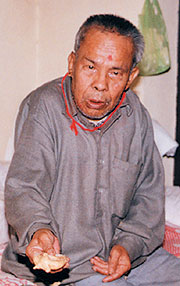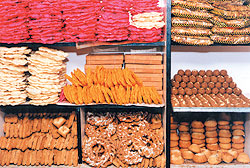 If you think fast food is a new phenomenon in Nepali society, consider this: Gobinda Das Rajkarnikar, 73, claims that his roti outlet in now-crowded Maru has been serving quick meals to government employees and traders for the last 100 hundred years.
If you think fast food is a new phenomenon in Nepali society, consider this: Gobinda Das Rajkarnikar, 73, claims that his roti outlet in now-crowded Maru has been serving quick meals to government employees and traders for the last 100 hundred years. In recent decades many have relinquished their generations-old family occupation of making traditional, labour-intensive Nepali sweets and snacks, or have felt the need to include more eye-catching Indian items on their menus to survive changing demands. But Gobinda Das, 73, is undeterred. He firmly believes that trading only in good old Nepali delicacies is still economically viable. Moreover, he believes he has obligations to tradition.
"I am a master craftsman as far as making sweets are concerned, and I am an expert on the traditions and norms of sweet-making," he says with a twinkle in his eye, and no hint of modesty.
Traditional sweet-making in Kathmandu Valley is a complex sociological matter that brings together art and tradition. Births, marriages, birthdays, deaths and other cultural and social occasions require a mind-boggling variety of sweets with particular shapes and ingredients, each symbolic of certain norms and beliefs. And these might differ among the many sub-clans within the Newar communities. A real sweet-maker needs to know all of this-this is not a tradition that forgives negligence.
 The devotion of Gobinda Das' family to the national sweet heritage of the country means their store has quite a reputation. The Hanuman Dhoka Darbar still relies on supplies from his shop for all the royal pujas there. The Kumari's house ordered the 32 varieties of traditionally prescribed sweets when the new Kumari was instated recently. And during the Rana regime, the queens used to rely on Gobinda Das' family to keep them dudh swari, mohan keshari and other delectations required for their Tij fasts.
The devotion of Gobinda Das' family to the national sweet heritage of the country means their store has quite a reputation. The Hanuman Dhoka Darbar still relies on supplies from his shop for all the royal pujas there. The Kumari's house ordered the 32 varieties of traditionally prescribed sweets when the new Kumari was instated recently. And during the Rana regime, the queens used to rely on Gobinda Das' family to keep them dudh swari, mohan keshari and other delectations required for their Tij fasts. For eight generations, sweet-making has been the main family business of the Rajkarnikars. His great-grandfather Bhandas, migrated from Patan in search of fortune. His start-up capital: "nyarka pyamo" (Rs 5), his skill: traditional sweet-making, already his family's occupation. He did well for himself. So well, that five generations later his outlet sells sweets worth some Rs 60,000 per day during the festival and wedding seasons. Gobinda Das's 21-year-old son now spends all his time supervising production and managing the shop. And young Durlabh Das is determined to pass on the family business to his son, one day. Take a walk down Maru and watch Gobinda Das getting ready for the Tihar rush.


